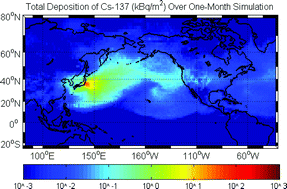The Fukushima Daiichi Nuclear Power Station was badly damaged in the magnitude 9.0 earthquake and tsunami which occurred off the east coast of Japan in March last year. The resulting meltdown of nuclear fuel rods and explosions at the plant caused the leakage of nuclear material.
In this fascinating Energy & Environmental Science article John E. Ten Hoeve and Mark Z. Jacobson working at Stanford University report a detailed analysis of the effects of this accident on the health of the population worldwide. They estimate that the accident resulted in 130 cancer-related mortalities (with a lower confidence limit of 15 and upper limit of 1100) and 180 (24–1800) cancer-related morbidities worldwide.
The authors also modelled a hypothetical accident at the Diablo Canyon Power Plant in California, USA, predicting that such an event could result in a ~25% higher morality level due to the meteorological conditions found there.
In his Opinion article commenting on the results, Nobel Prize-winning physicist Burton Richter comments that “My rough analysis finds that health effects, including mortality, would have been much worse with fossil fuel used to generate the same amount of electricity as was nuclear generated.” A surprising conclusion perhaps and something policy makers will no doubt be thinking hard about in the months and years to come.
Read this Energy & Environmental Science article in full today along with the accompanying Opinion and response:
Worldwide health effects of the Fukushima Daiichi nuclear accident
John E. Ten Hoeve and Mark Z. Jacobson
DOI: 10.1039/C2EE22019A
Opinion on “Worldwide health effects of the Fukushima Daiichi nuclear accident” by J. E. Ten Hoeve and M. Z. Jacobson, Energy Environ. Sci., 2012, 5, DOI: 10.1039/c2ee22019a
Burton Richter
DOI: 10.1039/C2EE22658H
Reply to the ‘Opinion on “Worldwide health effects of the Fukushima Daiichi nuclear accident”’ by B. Richter, Energy Environ. Sci., 2012, 5, DOI:10.1039/c2ee22658h
John E. Ten Hoeve and Mark Z. Jacobson
DOI: 10.1039/C2EE22659F











